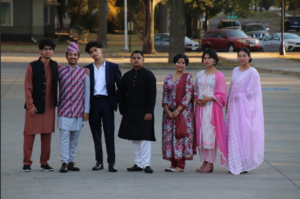Covering Corona: Online Classes

It has been almost one year since the United States entered a state of emergency in the face of the Coronavirus, and it is apparent that in today’s world that Covid-19 has heavily impacted the day to day lives of people all across the world. In this series, we will take a look into just what has changed, and how it affects our lives today.
This article will take a look at the online classes, both synchronous and asynchronous, and how they have impacted a student’s education. Synchronous online learning includes live Zoom meetings that many students must attend. The professor gives assignments, mimicking the style of an in-person classroom. Asynchronous learning gives students all the resources they need at one time, allowing a student to take in the content and complete assignments at their own time, with deadlines set for each unit. Both styles have been adopted by instructors across the campus in response to the virus.
To start us off I elected to hit close to home for everyone here on campus. When asking different students, I received many critical opinions of the current online system. Ernst Bateman, a sophomore cyber operations major, said he did not appreciate the switch to the Zoom based learning, and in his own words says, “Online bad. Bad for education, make dumb. No one like Zoom. Zoom = bad. Recorded classes is okay, but no one likes Zoom.”
Another student sharing his concern is Peter Bui. He felt that the change to online has had a negative impact on his learning experience, saying that not being able to have a traditional face to face experience, it is difficult to make a connection to the content.
However, in favor of the new system is a student out of state, enrolled exclusively in online classes. They said they appreciated the overall ease the online classroom offered, saying, “Having Zoom classes is pretty cool. I still need to get up and stuff, keep a schedule, at least there is still a professor there.” When asked what style of online class they preferred, they had this to say, “Both are pretty good, but I like the Zoom meetings cause I can ask questions and the breakouts are cool too.”
I reached out to Sandi Steinhoff-Muller, the instructor of special education and longtime educator, to hear how she feels the virus has affected education this past year. Coming from a background of working with children, she feels that by cutting off the in-person aspects of learning, we have deprived students of a much-needed part of teaching, and that many students in k-12 through University will be negatively affected by the year the virus has taken from them. However, when it came to the topic of Zoom, Sandi sounded hopeful.
“I think Zoom will change how things work in schools. Instead of missed days, students and teachers can hold class in Zoom. I also believe that Zoom can be helpful for tutoring and with students who need extra help, instead of coming in before or after school, because there can always be scheduling issues, it will be easier for teachers to just say, why don’t we hop in on Zoom and I can help you then …. With the share screen function, teachers can even walk parent’s through the work and really understand where their child is at in the content.”
Given all the negative views on the system, it is clear there are advantages to using online classrooms such as Zoom. Thanks to its convenience and ease of use, it can be an effective tool for educators and students alike. While not a true alternative for the regular classroom as expressed by many, it is not without its merits, and as teaching strategies develop, teacher’s may learn how to use the online conferences and video classrooms in the most effective way possible.
Despite the fear and sadness from the year of pandemic panic, it is clear that our education system has made many changes, some which may carry over after the disease has passed. Thanks to the new norms we as a nation have grown accustomed to, in a world where the vaccine has eliminated any fear of infection, our schools may not be the same as they were in our pre-COVID world.







